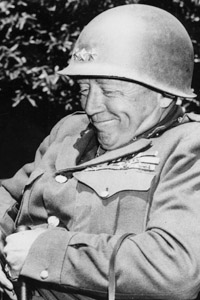
Q. A recent book review in the New York Times stated that General George S. Patton Jr. “clearly suffered from bipolar disorder, though the condition wasn’t recognized at the time.” Is this a confirmed and accepted truth? Has there ever been a legitimate concern raised about Patton’s mental health?
Jonathan Beard
New York, N.Y.
A. We live in a media-driven world where unproven claims and allegations are all too often accepted as fact. There’s no clear evidence that Patton suffered from such a disease.
Of course, there has been considerable speculation about whether a failing in Patton’s mental health could explain his erratic behavior—the posturing, profanity, verbal abuse, and his desperate hunger for fame and praise. Some have advanced a theory that a fall from a polo pony left him with mental defects. At least one historian, Daniel K. R. Crosswell, has argued that “Patton was mad. Not barking at the moon or falling down and eating the rug mad, but mad nonetheless.” The general, Crosswell claimed, had a lifelong struggle with bipolar disorder inherited from his father and aunt.
The National Institute of Mental Health (NIMH) says that bipolar disorder (also known as manic depression) causes dramatic shifts in a person’s mood, energy, and ability to carry out day-to-day tasks. “Symptoms of bipolar disorder are severe,” according to NIMH. “They are different from the normal ups and downs that everyone goes through from time to time” and can damage relationships, affect work performance, and incapacitate the individual. The disease can be difficult to diagnose.
It is true that Patton was unpredictable and often angry (more so in the 1920s than later). He suffered periods of what was certainly depression, usually the result of a personal or professional setback. But his mood swings did not last long. Nor did he ever become incapacitated. If Patton had bipolar disorder, how could he have successfully functioned in two world wars?
Patton did have dyslexia, a reading and writing disorder that made academics difficult for him. A common trait of dyslexics is low self-esteem, which Patton suffered from his entire life.
Dyslexia also may have induced the mood swings that led to the rash statements and actions for which he was known and which often got him into trouble. Overall, however, Patton did not exhibit the classic symptoms of someone with bipolar disorder.
Carlo D’Este, a military historian, is the author of seven books, including the acclaimed Patton: A Genius for War. He received the 2011 Pritzker Military Library Literature Award for Lifetime Achievement.
Anything about military history you’ve always wanted to know? Submit your question to MHQeditor@weiderhistory.com, and we’ll ask an expert in the subject to answer it.





